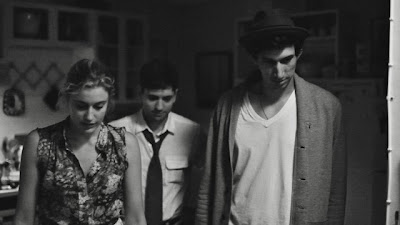But this sequence you hardly remember actually contains the film's most critical line, a line which threatens to skip right on by, a self-help ship passing in the night. Frances, as characters in stasis are wont to do, lays in the tub. Her mother batters the door. She needs to get in. Frances rebuffs her attempts. Finally, her mother cries: "How long is it going to take?"
I have been a fairly studious Greta Gerwig fan ever since I took the Mumblecore plunge, the talky, low-budget genre wherein Gerwig got her start before branching off into the pseudo-mainstream. Even if her films have not always worked for me, her performances, generally daring and quirkily inventive, have left me impressed. (In particular, her portrayal of an untraditional mental breakdown in last year's "The Dish and the Spoon.") Still, I often found myself wondering, how long would it take for Gerwig to find the perfect role that specifically employed her unique off-centeredness as an actress - mannerisms, scattered line readings, cheekiness - to fully inform the character she was playing?
Well, as is the tragic case in Hollywood, or off-Hollywood (?), often females have to take upon themselves to author that character. So Gerwig teamed with her significant other, Baumbach, to imagine Frances, 27 years old, so poor she cannot afford to live in Tribeca (egads!), couch-surfing, apprenticing as a dancer, which is what she wants to "do". Except the film, both delicately and obviously, hints that this dream is down to last its embers.
Gerwig is a little wonky, immature and uncertain, drifting, perhaps dangerously, but without comprehension (or the urge?) of how to find resolve. She and her best friend Sophie (Mickey Sumner), adorned with oversized glasses that don't suggest a hipster as much as an adolescent by way of an adult, still seem to reside in a make-believe world of sleepovers and girl talk even as Sophie drifts toward possible marriage with a baseball cap wearing bro.
That last one is key. Sophie has someone, Frances does not. In fact, Frances and one of her part-time roommates - who is writing a spec screenplay for "Gremlins 3" - deem her "undatable." She seems okay with it. This does not, gratefully, turn into Frances needing to find a man to become a woman. In a way, it is not even about Frances becoming a woman - rather, her character trajectory is more like chicken scratches than a classical arc.
I have been a fairly studious Noah Baumbach fan ever since a few of my best friends introduced me to his "Kicking and Screaming" and I fell smack-dab into its cult, incessantly quoting it to anyone who cares (or does not) to listen. I have, more or less, enjoyed all his films, and yet in all his films - even in the sound "Squid and the Whale" - you could sense him struggling to put it all together. I wondered, how long will it take? Will it ever happen?
Here, at last, it does, exhibiting a focus and tightness absent in his other work but still coming across so airy and free-wheeling. The quick cuts never play as artifice, more as the miscellaneous pieces of a life puzzle, one which Frances struggles mightily to put together. A side trip to Paris that is as hilarious as it is sad (which is the movie as a whole) employs the mandatory shot of The Eiffel Tower to excellent effect. Frances tries to light a cigarette. It just won't take. Angered she pushes off the rail she has been leaning against and walks away, revealing that infamous iron lattice tower behind, as if her back is turned to what is typical.
Frances is atypical, even if this whole early midlife crisis is not. The overarching argument, however, is not that Frances needs to find herself, but find her way in life. Her core temperature, so to speak, is intact, and she needs to find her bearings. Any bearings, any bearings at all.
The last shot is strangely, sweetly perfect. I will not reveal it but it seems to suggest she has not completely owned who she is yet. She remains a work in progress. Aren't we all?






No comments:
Post a Comment